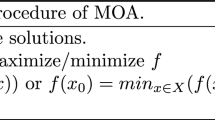Abstract
A novel tool for symbolic regression, analytical programming and its application for the synthesis of a new robust feedback control law are presented in this paper. This synthesized robust chaotic controller secures the fully stabilization of several selected sets containing one-dimensional, two-dimensional and evolutionary synthesized discrete chaotic systems. The paper consists of the descriptions of analytic programming as well as selected chaotic systems, used heuristic and cost function design. For experimentation, self-organizing migrating algorithm and differential evolution were used.

















Similar content being viewed by others
References
Abedini M, Vatankhah R, Assadian N (2012) Stabilizing chaotic system on periodic orbits using multi-interval and modern optimal control strategies. Commun Nonlinear Sci Numer Simul 17(10):3832–3842
Aydin I, Karakose M, Akin E (2010) Chaotic-based hybrid negative selection algorithm and its applications in fault and anomaly detection. Expert Syst Appl 37(7):5285–5294
Aziz-Alaoui MA, Robert C, Grebogi C (2001) Dynamics of a HènonLozi-type map. Chaos Solitons Fractals 12(12):2323–2341
Caponetto R, Fortuna L, Fazzino S, Xibilia MG (2003) Chaotic sequences to improve the performance of evolutionary algorithms. IEEE Trans Evol Comput 7(3):289–304
Davendra D, Zelinka I, Senkerik R (2010) Chaos driven evolutionary algorithms for the task of PID control. Comput Math Appl 60(4):1088–1104
Davendra D, Zelinka I, Senkerik R, Bialic-Davendra M (2010) Chaos driven evolutionary algorithm for the traveling salesman problem. In: Davendra D (ed) Traveling salesman problem, theory and applications. InTech Europe, Rijeka
Davendra D (2010) Evolutionary algorithms and the edge of Chaos. In: Zelinka I, Celikovsky S, Richter H, Chen G (eds) Evolutionary algorithms and chaotic systems, vol 267., Studies in computational intelligence. Springer, Berlin Heidelberg, pp 145–161
Davendra D, Bialic-Davendra M, Senkerik R (2013) Scheduling the lot-streaming flowshop scheduling problem with setup time with the chaos-induced enhanced differential evolution. In: 2013 IEEE Symposium on Differential Evolution (SDE), pp 119–126
Deugo D, Ferguson D (2004) Evolution to the Xtreme: evolving evolutionary strategies using a meta-level approach. In: CEC2004 Congress on Evolutionary Computation, 19–23 June 2004, pp 31–38
Dioşan L, Oltean M (2009) Evolutionary design of evolutionary algorithms. Genet Program Evol Mach 10(3):263–306
Edmonds B (2001) Meta-genetic programming: co-evolving the operators of variation. Elektrik 9(1):13–30
Eiben AE, Michalewicz Z, Schoenauer M, Smith J (2007) Parameter control in evolutionary algorithms. In: Parameter setting in evolutionary algorithms. Springer, Berlin Heidelberg, pp 19–46
Hilborn RC (2000) Chaos and nonlinear dynamics: an introduction for scientists and engineers. Oxford University Press, Oxford
Jones DF, Mirrazavi SK, Tamiz M (2002) Multi-objective meta-heuristics: an overview of the current state-of-the-art. Eur J Oper Res 137(1):1–9
Just W (2006) Principles of time delayed feedback control. In: Schuster HG (ed) Handbook of Chaos control. Wiley-VCH Verlag GmbH & Co, KGaA, pp 21–41
Kennedy J, Eberhart R (1995) Particle swarm optimization. In: IEEE International Conference on Neural Networks, November/December 1995, pp 1942–1948
Kominkova Oplatkova Z, Senkerik R, Zelinka I, Pluhacek M (2013) Analytic programming in the task of evolutionary synthesis of a controller for high order oscillations stabilization of discrete chaotic systems. Comput Math Appl 66(2):177–189
Kordík P, Koutník J, Drchal J, Kovářík O, Čepek M, Šnorek M (2010) Meta-learning approach to neural network optimization. Neural Netw 23(4):568–582
LdS Coelho, Mariani VC (2009) A novel chaotic particle swarm optimization approach using Hènon map and implicit filtering local search for economic load dispatch. Chaos Solitons Fractals 39(2):510–518
LdS Coelho, Grebogi RB (2010) Chaotic synchronization using PID control combined with population based incremental learning algorithm. Expert Syst Appl 37(7):5347–5352
LdS Coelho, Mariani VC (2012) Firefly algorithm approach based on chaotic Tinkerbell map applied to multivariable PID controller tuning. Comput Math Appl 64(8):2371–2382
May RMC (2001) Stability and complexity in model ecosystems. Princeton University Press, Princeton
Oplatkova Z (2010) Metaevolution: synthesis of optimization algorithms by means of symbolic regression and evolutionary algorithms. Lambert Academic Publishing, Saarbrücken, Germany
Ott E, Grebogi C, Yorke JA (1990) Controlling chaos. Phys Rev Lett 64(11):1196–1199
Pluhacek M, Senkerik R, Davendra D, Zelinka I (2013) On the behavior and performance of chaos driven PSO algorithm with inertia weight. Comput Math Appl 66(2):122–134
Pluhacek M, Senkerik R, Zelinka I (2014) Multiple choice strategy based PSO algorithm with chaotic decision making, a preliminary study. In: Herrero Á, Baruque B, Klett F et al. (eds) International Joint Conference SOCO’13-CISIS’13-ICEUTE’13, vol 239. Advances in intelligent systems and computing. Springer International Publishing, pp 21–30
Pluhacek M, Senkerik R, Zelinka I, Davendra D (2013) Chaos PSO algorithm driven alternately by two different chaotic maps—an initial study. In: 2013 IEEE Congress on Evolutionary Computation (CEC), 2013, pp 2444–2449
Price KV (1999) An introduction to differential evolution. In: Corne D, Dorigo M, Glover F (eds) New ideas in optimization. McGraw-Hill Ltd, London
Price KV, Storn RM, Lampinen JA (2005) Differential evolution—a practical approach to global optimization., Natural computing series. Springer, Berlin Heidelberg
Pyragas K (1992) Continuous control of chaos by self-controlling feedback. Phys Lett A 170(6):421–428
Pyragas K (1995) Control of chaos via extended delay feedback. Phys Lett A 206(56):323–330
Reeves CR (1993) Modern heuristic techniques for combinatorial problems. Halsted Press, New York
Richter H, Reinschke KJ (2000) Optimization of local control of chaos by an evolutionary algorithm. Phys D: Nonlinear Phenomena 144(34):309–334
Sadeghpour M, Salarieh H, Vossoughi G, Alasty A (2011) Multi-variable control of chaos using PSO-based minimum entropy control. Commun Nonlinear Sci Numer Simul 16(6):2397–2404
Senkerik R, Zelinka I, Davendra D, Oplatkova Z (2010) Utilization of SOMA and differential evolution for robust stabilization of chaotic Logistic equation. Comput Math Appl 60(4):1026–1037
Senkerik R, Oplatkova Z, Zelinka I, Davendra D (2013) Synthesis of feedback controller for three selected chaotic systems by means of evolutionary techniques: Analytic programming. Math Comput Model 57(12):57–67
Senkerik R, Davendra D, Zelinka I, Pluhacek M, Oplatkova Z (2012) An investigation on the chaos driven differential evolution: an initial study. In: 5th International Conference on bioinspired optimization methods and their applications, BIOMA 2012, pp 185–194
Senkerik R, Zelinka I, Oplatkova Z (2009) Optimal control of evolutionary synthesized chaotic system. In: 15th International Conference on Soft Computing—Mendel 2009, pp 220–227
Shirazi MJ, Vatankhah R, Boroushaki M, Salarieh H, Alasty A (2012) Application of particle swarm optimization in chaos synchronization in noisy environment in presence of unknown parameter uncertainty. Commun Nonlinear Sci Numer Simul 17(2):742–753
Smith JE, Fogarty TC (1997) Operator and parameter adaptation in genetic algorithms. Soft Comput 1(2):81–87
Sprott JC (2003) Chaos and time-series analysis. Oxford University Press, Oxford
Storn R, Price K (1997) Differential evolution. A simple and efficient heuristic for global optimization over continuous spaces. J Glob Opt 11(4):341–359
Zelinka I (2004) SOMA—Self-organizing migrating algorithm. New optimization techniques in engineering, vol 141., Studies in fuzziness and soft computing. Springer, Berlin Heidelberg, pp 167–217
Zelinka I, Chen G, Celikovsky S (2008) Chaos synthesis by means of evolutionary algorithms. Int J Bifurcation Chaos 18(04):911–942
Zelinka I (2009) Real-time deterministic chaos control by means of selected evolutionary techniques. Eng Appl Artif Intel 22(2):283–297
Zelinka I, Senkerik R, Navratil E (2009) Investigation on evolutionary optimization of chaos control. Chaos Solitons Fractals 40(1):111–129
Zelinka I, Raidl A (2010) Evolutionary synchronization of chaotic systems. In: Zelinka I, Celikovsky S, Richter H, Chen G (eds) Evolutionary algorithms and chaotic systems, vol 267., Studies in computational intelligence. Springer, Berlin Heidelberg, pp 385–407
Zelinka I, Chadli M, Davendra D, Senkerik R, Jasek R (2013) An investigation on evolutionary reconstruction of continuous chaotic systems. Math Computer Model 57(12):2–15
Zelinka I, Davendra D, Senkerik R, Jasek R, Oplatkova Z (2011) Analytical programming—a novel approach for evolutionary synthesis of symbolic structures. In: Kita E (ed) Evolutionary algorithms. InTech Europe, Rijeka
Acknowledgments
This work was supported by European Regional Development Fund under the project CEBIA-Tech No. CZ.1.05/2.1.00/03.0089, by Grant Agency of the Czech Republic—GACR P103/13/08195S, by the Development of human resources in research and development of latest soft computing methods and their application in practice project, reg. no. CZ.1.07/2.3.00/20.0072 funded by Operational Programme Education for Competitiveness, co-financed by ESF and state budget of the Czech Republic, partially supported by Grant of SGS No. SP2013/114, VSB—Technical University of Ostrava; by the Technology Agency of the Czech Republic under the Project TE01020197, and by Internal Grant Agency of Tomas Bata University under the project No. IGA/FAI/2013/012.
Author information
Authors and Affiliations
Corresponding author
Additional information
Communicated by I. Zelinka.
Rights and permissions
About this article
Cite this article
Senkerik, R., Kominkova Oplatkova, Z., Zelinka, I. et al. Utilization of analytic programming for the evolutionary synthesis of the robust multi-chaotic controller for selected sets of discrete chaotic systems . Soft Comput 18, 651–668 (2014). https://doi.org/10.1007/s00500-014-1220-1
Published:
Issue Date:
DOI: https://doi.org/10.1007/s00500-014-1220-1




